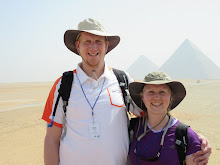I have to come clean.
Sometimes, the Bible frustrates me.
Now before you call me heretic, burn me at the stake, or
burn me social-media style, hear me out.
Sometimes, there are parts of the Bible I wish would have
been written to appease my need for historical accuracy. Basically, I wish it would have told me what
and who and where and when EXACTLY how the story went with all the details –
like a filmed documentary. EXACTLY how
it was.
One such example that has always bothered me, is why the “Pharaoh”
(King of Egypt) who is featured in the beginning of the book of Exodus is never
actually named. He is just called “Pharaoh.” It would be like saying “King.” “King” would not let the Israelites go free
out of Egypt. “King” endured horrible
plagues. “King” finally let them go and
then changed his mind.
King who?
Pharaoh who?
Which Pharaoh was it?!
Was it Rameses the III, the powerful ruler? Was it Tutemos
the II, the world influencer? Or was it even
Pharaoh Atun, the "Unitarian"?
Who exactly was this Pharaoh? And why don’t we know for sure
which one? If God had included that one
little detail, we could have learned so much more about that exact point in
history when God led his people out of Egypt's hand...
But God doesn’t give that detail. We are told over and over again how important
names are in the Bible yet Pharaoh is anonymous. Nameless Pharaoh remains a mystery, and I am
left frustrated at why we aren’t given these kinds of details…
Yet it was after spending some time in Egypt that it finally
sunk in why that detail was left out.
What I saw as an historical biblical hiccup, God was using to make a powerful
point...
We were in the Valley of the Kings: the famous sites of
tombs of Pharaoh after Pharaoh after Pharaoh.
By this point, we had been in Egypt a few days. We had seen so much wealth and power in all
these sites. Monstrous statues, adorned
temples, massive structures – all to show the power of the Pharaoh. And with each statue, each temple, each
structure, one Pharaoh tried to outdo the next, making their name live on and
making their name great.
And here we were, in the Valley of the Kings, the greatest example of each Pharaoh
in Ancient Egypt trying to outdo the Pharaoh before by making a bigger and
better tomb for himself. And then the thought struck me.
God was making a powerful point by omitting Pharaoh’s name
in the Bible in the book of Exodus. Here this Pharaoh was
abusing Israelite slaves by working them to the bone. And what were they doing? Building.
Building statues and structures and temples to make the Pharaoh look
powerful. To make Pharaoh immortal. To make Pharaoh’s name live on forever.
But God doesn’t give Pharaoh’s name. God intentionally leaves him as generic “Pharaoh”, a simple “King” because God wants to make sure this Pharaoh gets no recognition. This mere man is not immortal. This man’s
name does NOT live on. No-name Pharaoh is
mortal and human, and it’s the true God
– the Israelites’ I AM WHO I AM that
gets named. The name of the one and only
powerful God who defeats Pharaoh with plagues and takes these meager slaves out
of Egypt and makes them into a great nation.
And God wanted to remind his people when they recounted the
story who really mattered, who was truly the powerful and immortal God who saved his people. God wanted the people to remember it wasn’t
nameless Pharaoh who protected them, saved them, and brought them out. It was
the I AM.
The same I AM who protects you, saves you, and enfolds
you into his people.
Sometimes the big and powerful in this world like to make us
feel small, insignificant, like we matter to no one. But this Exodus story reminds us of the
truth. The truth is that the big and
powerful rise and fall, but it is God who remains the same, and God who gives
us purpose and significance. Not fame,
not money, not power, but GOD who gives us worth and saves us from serving mere
objects and material things that don’t last and don’t matter.
So even though I was at first frustrated with my question, “which
Pharaoh?” “Pharaoh who?” I was satisfied with an almost too-easy answer.
Pharaoh who??
Pharaoh who clearly wasn’t
God.



